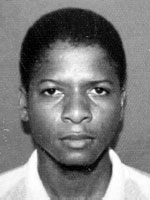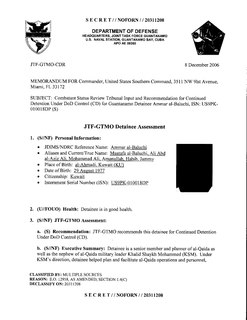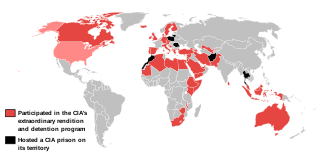Related Research Articles

Abu Zubaydah is a Saudi Arabian national currently held by the U.S. in the Guantanamo Bay detention camp in Cuba. He is held under the authority of Authorization for Use of Military Force Against Terrorists (AUMF).
Ibn al-Shaykh al-Libi was a Libyan national captured in Afghanistan in November 2001 after the fall of the Taliban; he was interrogated by the American and Egyptian forces. The information he gave under torture to Egyptian authorities was cited by the George W. Bush Administration in the months preceding its 2003 invasion of Iraq as evidence of a connection between Saddam Hussein and al-Qaeda. That information was frequently repeated by members of the Bush Administration, although reports from both the Central Intelligence Agency (CIA) and the Defense Intelligence Agency (DIA) strongly questioned its credibility, suggesting that al-Libi was "intentionally misleading" interrogators.

Khalid Sheikh Mohammed is a Pakistani terrorist held by the United States at the Guantanamo Bay detention camp under terrorism-related charges. He was named as "the principal architect of the 9/11 attacks" in the 9/11 Commission Report.

Ahmed Khalfan Ghailani is a conspirator of the al-Qaeda terrorist organization convicted for his role in the bombing of embassies in Kenya and Tanzania. He was indicted in the United States as a participant in the 1998 U.S. embassy bombings. He was on the FBI Most Wanted Terrorists list from its inception in October 2001. In 2004, he was captured and detained by Pakistani forces in a joint operation with the United States, and was held until June 9, 2009, at Guantanamo Bay detention camp; one of 14 Guantanamo detainees who had previously been held at secret locations abroad. According to The Washington Post, Ghailani told military officers he is contrite and claimed to be an exploited victim of al-Qaeda operatives.
Muhammad Naeem Noor Khan is an alleged Al-Qaeda operative and computer expert. Arrested in Pakistan on 13 July 2004, files found on his laptop contained details of a terrorist plot to attack U.S. financial buildings and locations in the UK, including Heathrow airport.

Ammar Al-Baluchi is a Pakistani citizen in U.S. custody at Guantanamo Bay detention camp. Charges against him include "facilitating the 9/11 attackers, acting as a courier for Osama bin Laden and plotting to crash a plane packed with explosives into the U.S. consulate in Karachi."

Mustafa al-Hawsawi is a Saudi Arabian citizen. He is alleged to have acted as one of many financial facilitators of the September 11 attacks in the United States. However, the U.S. Senate Intelligence Committee report on CIA torture which was publicly released on December 9, 2014, disclosed an internal CIA cable between the chief of interrogations and the CIA Headquarters wherein he expressed reservations regarding al-Hawsawi's alleged role and involvement in the plot. The report reveals "following al-Hawsawi's first interrogation session, Chief of Interrogations asked CIA Headquarters for information on what al-Hawsawi actually "knows," saying: "he does not appear to the [sic] be a person that is a financial mastermind."

Extraordinary rendition, also called irregular rendition or forced rendition, is the government-sponsored abduction and extrajudicial transfer of a person from one country to another with the purpose of circumventing the former country's laws on interrogation, detention and torture. Recent renditions have been carried out by the United States government.
Ghost detainee is a term used in the executive branch of the United States government to designate a person held in a detention center, whose identity has been hidden by keeping them unregistered and therefore anonymous. Such uses arose as the Bush administration initiated the War on Terror following the 9/11 attacks of 2001 in the United States. As documented in the 2004 Taguba Report, it was used in the same manner by United States (US) officials and contractors of the Joint Interrogation and Debriefing Center at the Abu Ghraib prison in Iraq in 2003–2004.

Abu Faraj al-Libi is an assumed name or nom de guerre of a Libyan alleged to be a senior member of the al-Qaeda terrorist organization. His real name is Mustafa Faraj Muhammad Muhammad Masud al-Jadid al-Uzaybi. He was arrested by Pakistan's Inter-Services Intelligence (ISI) on May 2, 2005, in Mardan. Finding al-Libi was a joint effort of the Central Intelligence Agency's (CIA) Special Activities Division and Pakistan's Special Forces.
Extrajudicial prisoners of the United States, in the context of the early twenty-first century War on Terrorism, refers to foreign nationals the United States detains outside of the legal process required within United States legal jurisdiction. In this context, the U.S. government is maintaining torture centers, called black sites, operated by both known and secret intelligence agencies. Such black sites were later confirmed by reports from journalists, investigations, and from men who had been imprisoned and tortured there, and later released after being tortured until the CIA was comfortable they had done nothing wrong, and had nothing to hide.

In military terminology, a black site is a location at which an unacknowledged black operation or black project is conducted. It can refer to the facilities that are controlled by the CIA and used by the U.S. government in its War on Terror to detain alleged unlawful enemy combatants.
Mohammed Omar Abdel-Rahman is an Egyptian who was in United States custody in one of the CIA's "black sites". Also known as "Asadullah" Human Rights Watch reports he is the son of Sheikh Omar Abdel-Rahman, the "blind sheikh" who was convicted of involvement in the first al Qaeda bombing of the World Trade Center, in 1993. Mohammed is alleged to have run a training camp, and to have had a role in operational planning.
Riyadh, alternately Riad, alternately Riyadh the facilitator, is a pseudonym that was given to a number of individuals who were suspected to be member of al-Qaeda. American intelligence officials and the press used the pseudonym for at least two individuals.

Al Hajj Abdu Ali Sharqawi is a Yemeni alleged Al-Qaeda associate who is currently being held in the United States's Guantanamo Bay detention camps, in Cuba.
Saud Memon was a Pakistani businessman from Karachi dealing in yarn and textiles. Memon was said to own the shed where American journalist Daniel Pearl was killed. Memon was wanted by law-enforcement agencies in the Pearl case for supposedly providing the place where Pearl was beheaded and subsequently buried. However, Memon was never formally charged.
Hassan Ghul, born Mustafa Hajji Muhammad Khan, was a Pakistani member of al-Qaeda who revealed the kunya of Osama Bin Laden's messenger, which eventually led to Operation Neptune Spear and the death of Osama Bin Laden.
Tariq Mahmood is a British Pakistani man who was captured in Islamabad by Pakistani security forces in October 2003. His family reports that Tariq was tortured, while in Pakistani custody, with the knowledge or cooperation of UK and American security officials.
Mohammed Al Afghani is a citizen of Afghanistan, held by the United States in the CIA's network of black sites.
Marwan Jabour is a former captive held in the CIA's network of black sites. He was raised him Saudi Arabia by his Palestinian guest worker parents. He moved to Pakistan for study, in 1994.
References
- ↑ Hasan, Syed Shoaib (21 August 2007). "Pakistan's 'extraordinary prisoner'". BBC News . Archived from the original on 12 November 2012. Retrieved 13 May 2009.
- 1 2 Burke, Jason; Paul Harris; Martin Bright (8 August 2004). "Suspect arrested in Pakistan may hold al-Qaeda's secrets". The Observer . Archived from the original on 28 August 2013. Retrieved 13 May 2009.
- ↑ "Pakistan arrests five Qaeda, militant suspects". China Daily . 4 August 2004. Archived from the original on 11 April 2008. Retrieved 13 May 2009.
- ↑ "List of 'Ghost Prisoners' Possibly in CIA Custody". Human Rights Watch. 1 December 2005. Archived from the original on 10 November 2008. Retrieved 13 May 2009.
| | This Pakistani biographical article is a stub. You can help Wikipedia by expanding it. |